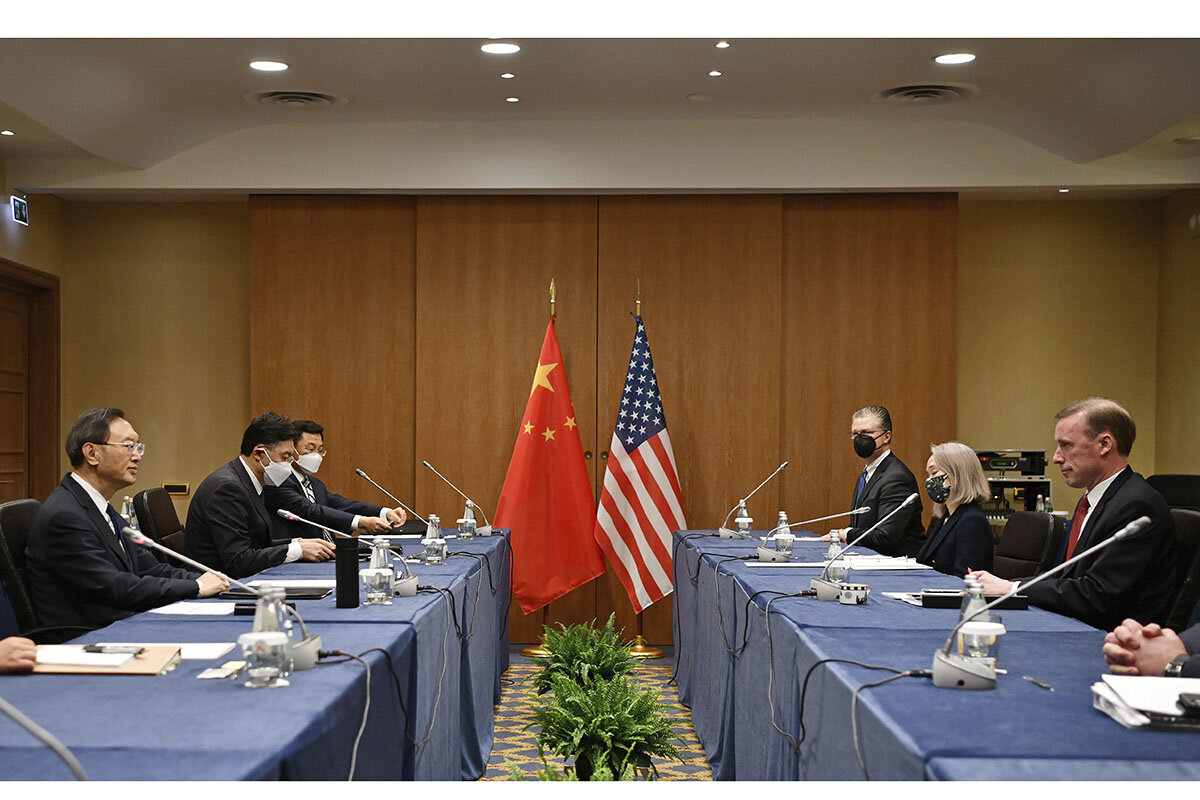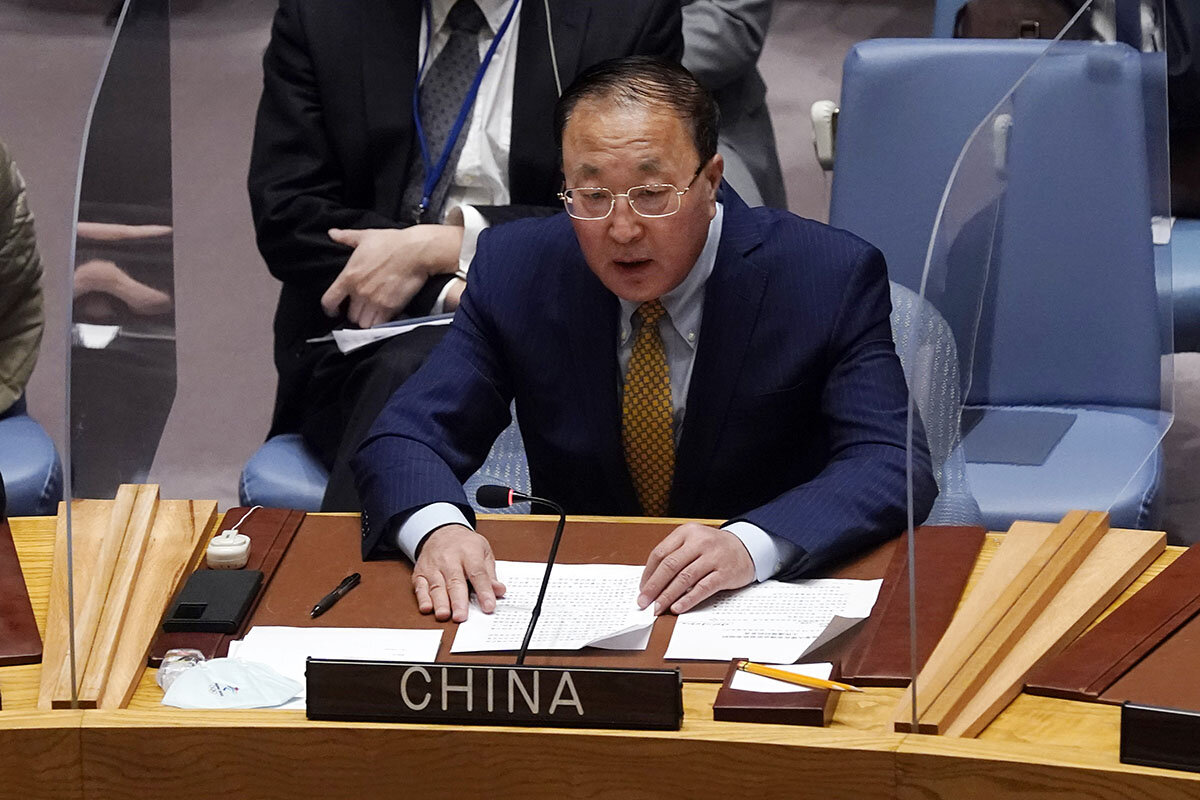Ukraine invasion leaves China uncomfortably on the fence
Loading...
| London
China’s “unlimited” strategic partnership with Russia, announced just before the Beijing Winter Olympics, has got off to a bad start for Chinese leader Xi Jinping. Russia’s invasion of Ukraine has not gone to plan and is proving awkward for Beijing.
China is fence-sitting, not criticizing the invasion but insisting that it is not party to the conflict. At the same time, Mr. Xi has a clear interest in the success of his autocratic ally – or at least the avoidance of failure.
Why We Wrote This
Six weeks ago, Russia and China said their friendship had “no limits.” But Moscow’s stuttering invasion of Ukraine leaves Xi Jinping in an awkward position.
The Chinese leader envisions the 21st century as a “Chinese century,” when Beijing will be the dominant world power. It will need one major ally, at least, on the world stage.
Besides that, the invasion has badly disrupted China’s ambitious Belt and Road trade initiative to create a land bridge to Europe. Its key rail links run through Russia and Belarus, both now subject to far-reaching Western sanctions.
China could risk sanctions too, if it did anything to help Russia offset the impact of the measures the West has imposed. Beijing cannot turn its back on its ally, but its commerce with the West is worth 10 times more than the business it does with Russia.
Fence-sitting could yet leave China with a bad case of splinters.
Xi Jinping is “unsettled.”
That’s the term the director of America’s CIA has used to assess the Chinese leader’s mood in the face of the unexpected difficulties that his closest ally, Russian President Vladimir Putin, is facing in Ukraine.
And it has set the context for this week’s U.S. diplomatic push to dissuade China from making an end run around Western economic sanctions on Russia, or from providing Moscow with drones or other weapons. National security adviser Jake Sullivan met Chinese counterpart Yang Jiechi in Rome on Monday, warning him of “the potential implications and consequences” of such support.
Why We Wrote This
Six weeks ago, Russia and China said their friendship had “no limits.” But Moscow’s stuttering invasion of Ukraine leaves Xi Jinping in an awkward position.
It also helps explain Beijing’s exercise in diplomatic fence-sitting so far: abstaining in a United Nations vote condemning Mr. Putin’s attack rather than opposing the motion, but also refraining from any criticism of Russia’s action.
China has its own reasons for wanting the violence in Ukraine to end, but Mr. Xi’s perspective on how that should come about, and what should follow, remains dramatically different from the West’s.
His top short-term interest: to ensure Mr. Putin’s invasion doesn’t end in outright defeat or, even worse, in a loss of power for his autocratic ally.
That’s because of Mr. Xi’s larger long-term vision of a “Chinese century,” when his nation’s economic and political heft, he believes, will make Beijing the world’s dominant power. China will need one major ally, at least, on the world stage.
That vision is one he hopes to see validated, with Ukraine in the rearview mirror, at a Communist Party conference later this year confirming him as the first leader since Mao Zedong to serve a third term of office.
Indeed if Mr. Xi thinks that Mr. Putin has reached a point in the Ukraine onslaught when he can somehow claim a degree of “victory,” the Chinese leader could yet seek to step up to take the diplomatic lead in forging an agreement acceptable to all sides.
None of that, however, minimizes the challenges that the violence in Ukraine poses him. In fact, “unsettled” may well be an understatement.
The war itself presents a basketful of problems. The big picture is that China, like the Kremlin and most Western observers, had assumed that Mr. Putin’s huge advantage in troop numbers and armaments would make any invasion fairly quick and easy. Beijing also seems to have expected that Western sanctions would be piecemeal and fairly tame.
Both assumptions have proved false.
But the fighting has also directly affected China’s interests; Ukraine is a valued trading partner, important because of its huge grain exports as well as its Black Sea port of Odessa – now hunkering down for an expected Russian attack.
Mr. Putin’s invasion has also disrupted China’s ambitious Belt and Road initiative to create a land bridge for growing Chinese trade with Europe and beyond. The land bridge’s key rail links go through Russia and Belarus – both now targeted by unexpectedly far-reaching Western sanctions.
As Washington has increasingly been signaling to Mr. Xi, China itself could risk sanctions if it does anything to help Russia offset the impact of Western sanctions.
That presents a conundrum for Beijing. On the one hand, it does not want – and almost surely does not intend – to turn its back on its Russian ally. Besides, it depends on significant imports of gas and other commodities from Russia.
Still, China’s trade with Russia is dwarfed by its commerce with the West, amounting to just one-tenth of the total business it does with Europe and America. That is trade that Beijing will not want to endanger.
China’s response to the sanctions problem may well turn out to be the economic equivalent of the fence-sitting it has adopted at the United Nations.
It will likely increase commodity trade with Russia, and it may boost its exports of basic consumer products, to help the Russian government. But sanctions-busting by major Chinese companies seems less likely, if only because of their own self-interest in safeguarding far more lucrative Western markets.
A potentially bigger, long-term problem for China is harder to quantify: the reputational risk it would run, not just with governments, but with Western citizens and major Western businesses, if Mr. Xi is seen to be an enabler of the brutal violence being visited on Ukraine.
The widespread sense of horror and anger at the violence has already helped prompt an array of sanctions far tougher than Mr. Xi could have expected.
Maybe, over time, that sense of unity and purpose in the West will wane. Mr. Xi will hope so.
But if not, fence-sitting – as the old saying goes – could yet leave China with a serious case of splinters.










